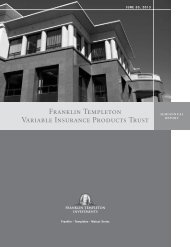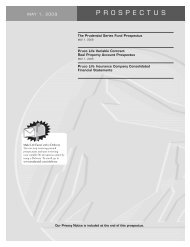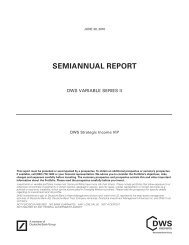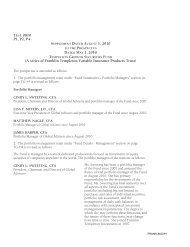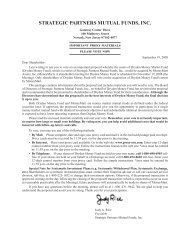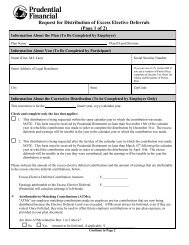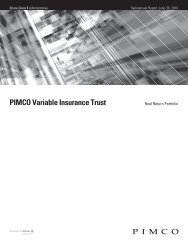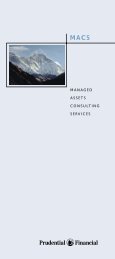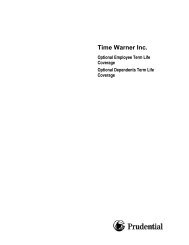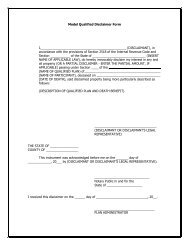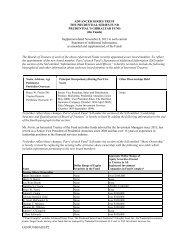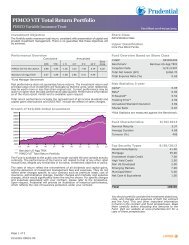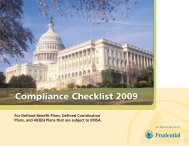Advanced Series Trust AST Academic Strategies Asset ... - Prudential
Advanced Series Trust AST Academic Strategies Asset ... - Prudential
Advanced Series Trust AST Academic Strategies Asset ... - Prudential
Create successful ePaper yourself
Turn your PDF publications into a flip-book with our unique Google optimized e-Paper software.
<strong>Prudential</strong> Core Taxable Money Market Fund<br />
Invests primarily in short-term money market<br />
instruments issued by the U.S. Government,<br />
its agencies and instrumentalities, commercial<br />
paper, asset-backed securities, funding<br />
agreements, variable rate demand notes, bills,<br />
notes and other obligations issued by banks,<br />
corporations and other companies, and<br />
obligations issued by foreign banks,<br />
companies or governments<br />
Money Market<br />
International Fixed-Income (Un-Hedged) (PIMCO). Under normal circumstances, PIMCO will invest at least 80% of the net assets<br />
attributable to this investment category in fixed income instruments that are economically tied to foreign (non-U.S.) countries,<br />
representing at least three foreign countries, which may be represented by forwards or derivatives such as options, futures contracts,<br />
or swap agreements. PIMCO will select the foreign country and currency compositions for this investment category based on an<br />
evaluation of various factors, including, but not limited to relative interest rates, exchange rates, monetary and fiscal policies, trade<br />
and current account balances. The average duration of the assets attributable to this investment category will normally vary within<br />
two years (plus or minus) of the duration of the JPMorgan GBI Global ex-U.S. FX NY Index Unhedged in USD. PIMCO will invest<br />
primarily in investment grade debt securities but may invest up to 10% of the total assets attributable to this investment category in<br />
high yield securities (also referred to as “junk bonds”) rated B or higher by Moody’s Investors Service Inc. (Moody’s), or equivalently<br />
rated by Standard & Poor’s (S&P) or Fitch Ratings Ltd. (Fitch), or, if unrated, determined by PIMCO to be of comparable quality.<br />
PIMCO may invest up to 15% of the total assets attributable to this investment category in securities and instruments that are<br />
economically tied to emerging market countries. For purposes of this investment category, an emerging market country shall be any<br />
country defined as an emerging or developing economy by the World Bank or its related organizations, or the United Nations or its<br />
authorities, or if the country is considered an emerging market country for purposes of constructing emerging markets indices.<br />
PIMCO may concentrate the assets attributable to this investment category in a relatively small number of issuers. Also, PIMCO may<br />
invest up to 10% of the total assets attributable to this investment category in preferred stocks.<br />
Emerging Markets Fixed-Income (PIMCO). For purposes of this investment category, an emerging market country shall be any country<br />
defined as an emerging or developing economy by the World Bank or its related organizations, or the United Nations or its<br />
authorities, or if the country is considered an emerging market country for purposes of constructing emerging markets indices. Under<br />
normal circumstances, PIMCO will invest at least 80% of the net assets attributable to this investment category in fixed income<br />
instruments that are economically tied to emerging market countries, which may be represented by forwards or derivatives such as<br />
options, futures contracts, or swap agreements. Such instruments may be denominated in non- U.S. currencies and the U.S. dollar.<br />
The average duration of the assets attributable to this investment category will normally vary within two years (plus or minus) of the<br />
duration of the JPMorgan Emerging Markets Bond Index. PIMCO will emphasize countries with relatively low gross national product<br />
per capita and with the potential for rapid economic growth. PIMCO will select the country and currency composition for this<br />
investment category based on its evaluation of relative interest rates, inflation rates, exchange rates, monetary and fiscal policies,<br />
trade and current account balances, and any other specific factors PIMCO believes to be relevant. PIMCO likely will concentrate the<br />
investment of assets attributable to this investment category in Asia, Africa, the Middle East, Latin America and the developing<br />
countries of Europe. Also, PIMCO may invest up to 10% of the total assets attributable to this investment category in preferred stocks.<br />
PIMCO may invest all of the assets attributable to this investment category in “junk bonds”, subject to a maximum of 15% of such<br />
total assets in securities rated below B by Moody’s, or equivalently rated by S&P or Fitch, or, if unrated, determined by PIMCO to be<br />
of comparable quality. PIMCO may concentrate the assets attributable to this investment category in a relatively small number of<br />
issuers.<br />
Investments in Non-Traditional <strong>Asset</strong> Classes. With the exception of the U.S. Real Estate and International Real Estate investment<br />
categories within the Real Estate asset class, it is expected that exposure to the remaining non-traditional investment categories will<br />
be obtained primarily through the allocation of Portfolio assets to certain Subadvisers. Consistent with the investment objectives and<br />
policies of the Portfolio, Underlying Fund Portfolios from time to time may be added to, or removed from, the Portfolio’s list of<br />
available investment options.<br />
Real Estate. As of January 31, 2010, exposure to the U.S. real estate and international real estate investment categories will be<br />
obtained through investments in the <strong>AST</strong> Cohen & Steers Real Estate Portfolio and the <strong>AST</strong> Global Real Estate Portfolio, respectively.<br />
The principal investments of these Underlying Portfolios are described below.<br />
Underlying Portfolio Principal Investments Traditional Investment Category<br />
<strong>AST</strong> Cohen & Steers Real Estate<br />
Invests primarily in equity securities of real<br />
estate companies<br />
Domestic Real Estate<br />
202



